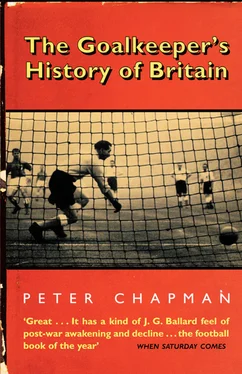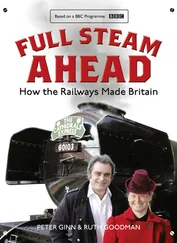There was obviously something to be learned from the wider world. As well as dispatching England, Uruguay scored seven against Scotland. The British teams’ performance helped start a debate about training methods. Merrick noted that before a match, teams like Hungary and Brazil did stretching exercises in the middle of the field. British teams tended to stand around stiffly, rubbing their hands from the cold and having a few desultory shots at their keeper. It was suggested that back home British clubs might put less emphasis on dogged cross-country runs and encourage the more refined, if slightly prissy, practice of training with a football. Not any old football, naturally. Officialdom remained sceptical about the new white one, rejecting it as contrary to our natural game. The absorbent leather ball was an important test of how men met the sport’s varying challenge. It was designed to be played in the rain. It was just like the sunny continentals to run up the white flag in the event of a downpour.
The selectors, anyway, had enough experimenting on their hands with a new generation of keepers. Ray Wood had come into the Manchester United team; Reg Allen had been part of United’s championship-winning side in 1952 but, as a result of his war experiences, had suffered a nervous breakdown. Wood appeared modest enough to satisfy national requirements: a degree of shyness meant, in his photographs, he tended to incline his head down and look guardedly at the camera. He also had elements of a greasy quiff, an unnecessary bit of styling when compared with the plastered-back fashion of the wartime generation. Did this place him in the ranks of surly youth? He played in two games, did his bit to register two victories, and was promptly left out of the team.
The next overseas visitors to Wembley were the new world champions, West Germany. Hungary had hammered them 8–3 in an early World Cup round in Switzerland but somehow the Germans contrived to keep going through the competition and met the Hungarians again in the final. Puskas was injured, the Germans triumphed. This showed characteristics not associated with them. They were the types who went on to an early offensive – Schlieffen Plans, Blitzkriegs and Operations Barbarossa – then collapsed when things got tough. The World Cup had showed ominous signs of an ability to claw their way back.
The selectors reverted to the tried and trusted. Wolverhampton Wanderers were the reigning league champions and Bert Williams had proved he was back to fitness. He made a reassuring return in England’s 3–1 win. One thing mentioned in the programme notes, and otherwise largely missed, was that the Germans were building for the future. Their players were part-timers, their team experimental. Uwe Seeler, for example, their centre-forward, was apprenticed to a Hamburg firm of furniture removers and now in the van for his country at only eighteen. It made him the youngest player to appear in a full Wembley international.
Chelsea won the league in 1955 and were invited to take part in the newly constituted European Cup for national champions. The London club wanted to enter, the Football Association said no. Unnecessary games on the continent would clog up the fixture list at home. And could teams going abroad for what amounted to little more than an exhibition match on, say, a Wednesday, guarantee they could have their players back fit and well for the proper stuff of life on the Saturday? We should maintain our distance.
In Downing Street, Churchill had had a stroke and decided to retire. He convalesced by bricklaying in his garden. What with the renovation of our house, there were bricks around and so, using sand instead of cement I put up a few temporary walls in our backyard. My dad said they were better than Churchill’s, which were more ‘serpentine’ than straight. Clearly the old boy could have benefited from a seven-year apprenticeship. But building walls seemed a thoroughly good thing to do.
The new prime minister, Sir Anthony Eden, agreed in that there was too much of this modish European integration stuff floating around. Germany and France, enemies for most of the last hundred years, were getting together, combining their coal and steel industries. Britain should block this and anything like it. It would only lead to the kind of imbalance in Europe that in the past we’d had to go in and sort out. Eden had previously been foreign secretary and knew about these overseas places. He said himself, he understood the affairs of the continent inside out. He’d studied Persian at Oxford.
In Persia, no less, we were under attack. British people had been forced to leave our oil refinery at Abadan. Things were worse in Egypt where types like General Nasser had taken over the Suez Canal. ‘Their canal’, they said. Really? Who built it? England’s football season got under way with its first international but showed that roughneck forces were infiltrating our borders, too. England played Wales in Cardiff and lost 2–1. The by now venerable veteran Bert Williams was harshly treated by some of the young Welsh forwards out to show off their muscle. They used shoulder barges, as the law said they could. But wasn’t there a spirit of the law they were offending? In the opposite goal, Jack Kelsey of Arsenal, whose display was key to the Welsh victory, thought so. He agreed a keeper was there to be hit, within reasonable limits. The way Williams had been targeted was unnecessary. That said, he quickly added that the rule book should not be changed. Take away the right to barge keepers and they’d end up like those on the continent – allowed to flap around when they had the ball and, as Kelsey said, ‘do just as they like’.
James Dean died as Rebel Without a Cause came out in London. More worrying to people than Johnny Ray, he didn’t cry but looked sullen, like the Teddy Boys on the streets, with their long Edwardian-style jackets, sideburns down to their necks, drainpipe trousers and thick rubber-soled shoes. A week later the ‘King of the Teds’, who lived around the Walworth Road in south London, was arrested for throwing a firework at a policeman; with intent to do him grievous bodily harm, said the police. Five years, said the judge.
Eden took the boat from Southampton to the USA for talks on the Middle East, where Russia was supporting Nasser’s seizure of the Suez Canal. Three weeks later he reported back to Parliament that the Americans fully supported the British position. The Russian leader Mr Khrushchev was booed as his train arrived in London at Victoria station. He had come by sea from Russia to Portsmouth and during his stay a Royal Navy frogman, Commander Lionel ‘Buster’ Crabb, disappeared in the harbour. The crew on Khrushchev’s boat complained they saw him surface and dive back underwater. No one else saw him again alive. There was nothing these people wouldn’t do. On the wireless I heard the Russians went in for things like ‘brainwashing’ and assumed Crabb’s body was back in Moscow, his brain extracted and being washed right now. Yet it was the Russians who protested. He was a spy, they said, and, incredibly, it was Eden who had to apologise.
Crabb had been awarded the George Medal in 1944 for searching the bottom of British ships for limpet mines. Of the wartime generation, there were pictures of him with lined face and wearing a black roll-neck jersey under his frogman’s suit. The passing of Bert Williams from the England team saw the goalkeepers’ roll-neck all but disappear. It had been creeping down towards and below the Adam’s apple for years. Keepers now appeared less wrapped up against the cold and, in a dangerous world, went bare-necked into the fray.
Manchester City reached the 1955 and 1956 Cup Finals with Bert Trautmann in goal. It had seemed a crazy decision by them to have a German keeper. Badly bombed in the war and with a large Jewish population, Manchester was not likely to feel well disposed towards him. Then, someone had to follow Frank Swift and, as England had found with Ditchburn, anything like a ‘normal’ goalkeeper would have had a tough job. No one would have been able to ‘do it like Frank could’. Manchester City’s first choice had been Alex Thurlow, who was taken ill and died of tuberculosis. Trautmann was drafted in, his one advantage that his nationality lowered the level of the crowd’s expectations. Anything good from a German was bound to be better than the fans had anticipated.
Читать дальше












